The 7 Best Email Clients for Linux in 2023
Email, an enduring method of communication, remains a fundamental way to share information; however, the preference has shifted from web applications to email clients over the years
An email client is software that allows users to manage their inbox, send, receive, and organize messages directly from a desktop or mobile phone.
Email clients offer numerous advantages; they have evolved from mere tools for sending and receiving messages to potent components of information management systems.
In this particular case, we shall focus on desktop email clients that allow you to manage your email messages from your Linux desktop without the hustle of having to sign in and out as is the case with web email service providers.
There are several native email clients for Linux desktops but we shall look at some of the best that you can use.
1. Thunderbird Email Client
Thunderbird is an open-source email client developed by Mozilla, it is also cross-platform and has some great attributes offering users speed, privacy, and the latest technologies for accessing email services.
Thunderbird has been around for a long time though it is becoming less popular, but still remains one of the best email clients on Linux desktops.
It boasts a plethora of features, including:
- Enables users to have personalized email addresses.
- A one-click address book.
- An attachment reminder.
- Multiple-channel chat.
- Tabs and search.
- Enables searching the web.
- A quick filter toolbar.
- Message archive.
- Activity manager.
- Large files management.
- Security features such as phishing protection, and no tracking.
- Automated updates plus many more.
To install Thunderbird on Linux, run:
$ sudo apt install thunderbird [On Debian, Ubuntu and Mint] $ sudo yum install thunderbird [On RHEL/CentOS/Fedora and Rocky/AlmaLinux] $ sudo emerge -a sys-apps/thunderbird [On Gentoo Linux] $ sudo apk add thunderbird [On Alpine Linux] $ sudo pacman -S thunderbird [On Arch Linux] $ sudo zypper install thunderbird [On OpenSUSE]
2. Evolution Email Client
Evolution is not just an email client but an information management software that offers an integrated email client including calendar and address book functionality.
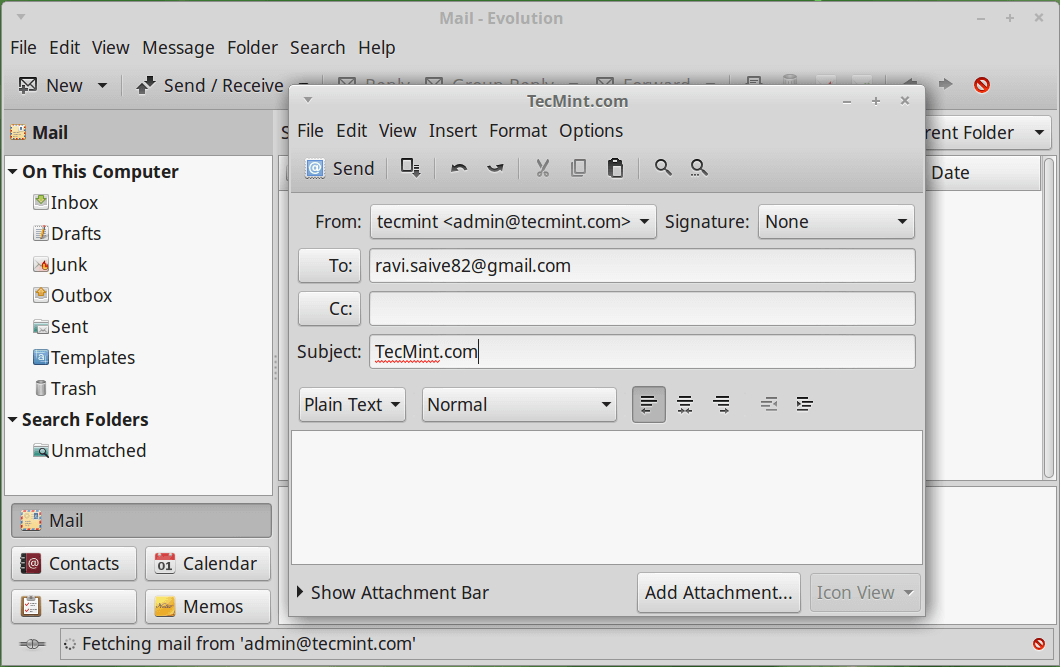
It offers some of the basic email management functionalities plus advanced features including the following:
- Account management.
- Changing mail window layout.
- Deleting and undeleting messages.
- Sorting and organizing mail.
- Shortcut key functionalities for reading mails.
- Mail encryption and certificates.
- Sending invitations by mail.
- Autocompletion of email addresses.
- Message forwarding.
- Spell checking.
- Working with email signatures.
- Working offline plus many others.
To install Evolution on Linux, run:
$ sudo apt install evolution [On Debian, Ubuntu and Mint] $ sudo yum install evolution [On RHEL/CentOS/Fedora and Rocky/AlmaLinux] $ sudo emerge -a sys-apps/evolution [On Gentoo Linux] $ sudo apk add evolution [On Alpine Linux] $ sudo pacman -S evolution [On Arch Linux] $ sudo zypper install evolution [On OpenSUSE]
3. KMail Email Client
KMail is a cutting-edge email client that seamlessly integrates with popular providers like Gmail, offers tools to enhance productivity, efficiently handles large email accounts, and supports a wide range of email protocols, including POP3, IMAP, and Microsoft Exchange (EWS).
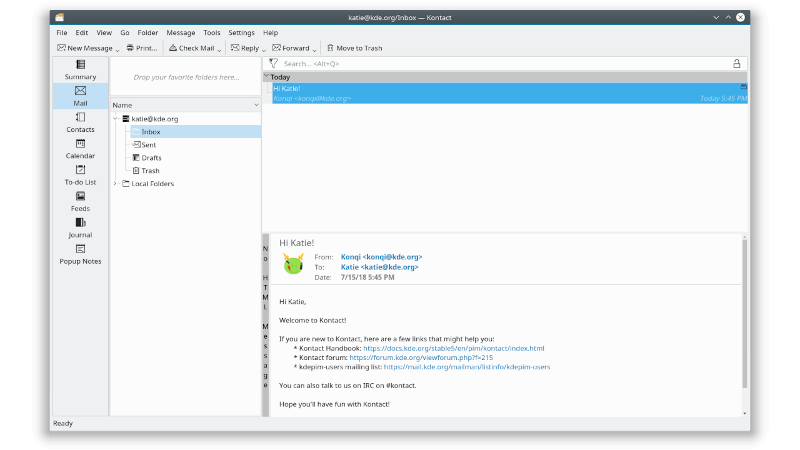
KMail boasts many of the same features as the other email clients we’ve discussed, including:
- Supports standard mail protocols such as SMTP, IMAP, and POP3.
- Supports plain text and secure logins.
- Reading and writing HTML mail.
- Integration of international character set.
- Integration with spam checkers such as Bogofilter, SpamAssassin plus many more.
- Support for receiving and accepting invitations.
- Powerful search and filter capabilities.
- Spell checking.
- Encrypted passwords are saved in KWallet.
- Backup support.
- Fully integrated with other Kontact components plus many more.
To install KMail on Linux, run:
$ sudo apt install kmail [On Debian, Ubuntu and Mint] $ sudo yum install kmail [On RHEL/CentOS/Fedora and Rocky/AlmaLinux] $ sudo emerge -a sys-apps/kmail [On Gentoo Linux] $ sudo apk add kmail [On Alpine Linux] $ sudo pacman -S kmail [On Arch Linux] $ sudo zypper install kmail [On OpenSUSE]
4. Geary Email Client
Geary is a simple and easy-to-use email client built with a modern interface for the GNOME desktop. If you are looking for a simple and efficient email client that offers the basic functionalities, then Geary can be a good choice for you.
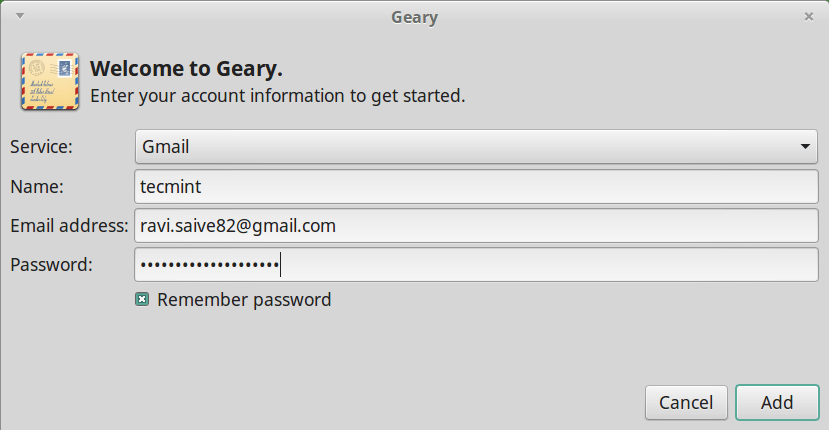
It has the following features:
- Supports common email service providers such as Gmail, and Yahoo! Mail, plus many popular IMAP servers.
- Simple, modern, and straight forward interface.
- Quick account setup.
- Mail organized by conversations.
- Fast keyword searching.
- Full-featured HTML mail composer.
- Desktop notifications support.
To install Geary on Linux, run:
$ sudo apt install geary [On Debian, Ubuntu and Mint] $ sudo yum install geary [On RHEL/CentOS/Fedora and Rocky/AlmaLinux] $ sudo emerge -a sys-apps/geary [On Gentoo Linux] $ sudo apk add geary [On Alpine Linux] $ sudo pacman -S geary [On Arch Linux] $ sudo zypper install geary [On OpenSUSE]
5. Sylpheed Email Client
Sylpheed is a simple, lightweight, easy-to-use, cross-platform email client that is featureful, it can run on Linux, Windows, Mac OS X, and other Unix-like operating systems.
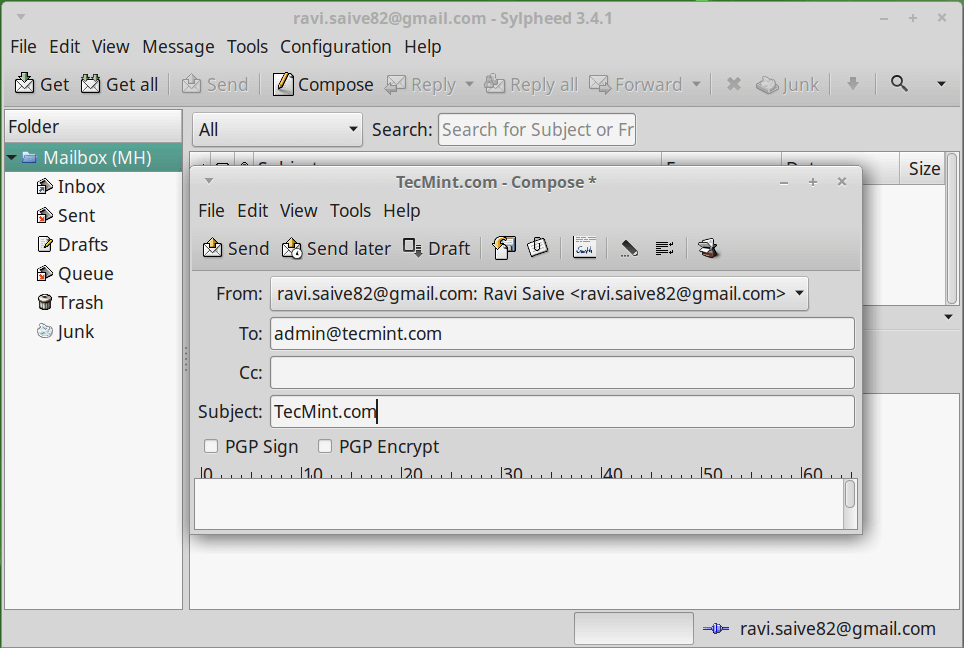
It offers an intuitive user interface with a focus on keyboard-oriented usage, catering to both new and power users with the following features:
- Simple, beautiful, and easy-to-use interface.
- Lightweight operations.
- Pluggable.
- Well-organized, easy-to-understand configuration.
- Junk mail control.
- Support for various protocols.
- Powerful searching and filtering functionalities.
- Flexible cooperation with external commands.
- Security features such as GnuPG, SSL/TLSv.
- High-level Japanese processing and many more.
To install Sylpheed on Linux, run:
$ sudo apt install sylpheed [On Debian, Ubuntu and Mint] $ sudo yum install sylpheed [On RHEL/CentOS/Fedora and Rocky/AlmaLinux] $ sudo emerge -a sys-apps/sylpheed [On Gentoo Linux] $ sudo apk add sylpheed [On Alpine Linux] $ sudo pacman -S sylpheed [On Arch Linux] $ sudo zypper install sylpheed [On OpenSUSE]
6. Claws Mail Email Client
Claws mail is a user-friendly, lightweight, and fast email client based on GTK+, it also includes news reader functionality.
It has a graceful and sophisticated user interface, also supports keyboard-oriented operation similar to other email clients, and works well for new and power users alike.
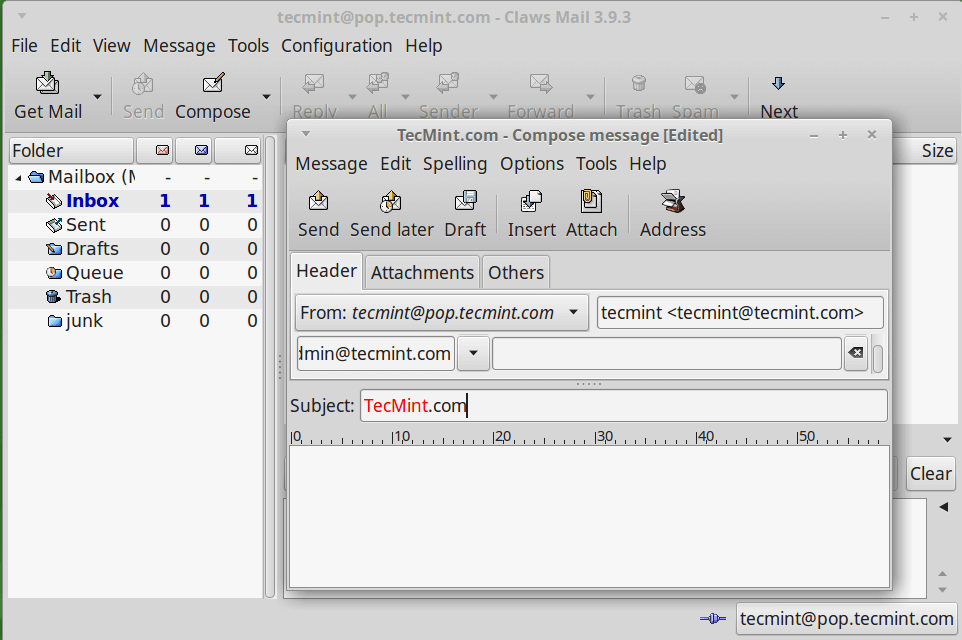
It boasts a plethora of features, such as:
- Highly pluggable.
- Supports multiple email accounts.
- Support for message filtering.
- Color labels.
- Highly extensible.
- An external editor.
- Line-wrapping.
- Clickable URLs.
- User-defined headers.
- Mime attachments.
- Managing messages in MH format offering fast access and data security.
- Import and export emails from and to other email clients plus many others.
To install Claws on Linux, run:
$ sudo apt install claws [On Debian, Ubuntu and Mint] $ sudo yum install claws [On RHEL/CentOS/Fedora and Rocky/AlmaLinux] $ sudo emerge -a sys-apps/claws [On Gentoo Linux] $ sudo apk add claws [On Alpine Linux] $ sudo pacman -S claws [On Arch Linux] $ sudo zypper install claws [On OpenSUSE]
7. Mailspring
Mailspring is an open-source cross-platform desktop email client that is known for its clean, modern interface and its powerful features that supports all major email providers, including Gmail, iCloud, Office 365, Outlook.com, Yahoo!, and IMAP/SMTP.
Mailspring also offers a number of features that make it a great choice for power users, such as:
- Unified inbox: View all of your email messages from all of your accounts in a single inbox.
- Snooze: Snooze emails until a later date or time.
- Send later: Schedule emails to be sent at a later date or time.
- Mail rules: Create rules to automatically sort and organize your email messages.
- Templates: Create templates for frequently sent emails.
- Offline search: Search your email messages even when you are not connected to the internet.
In addition to these features, Mailspring also offers a number of integrations with other popular productivity tools, such as Todoist, Slack, and Trello.
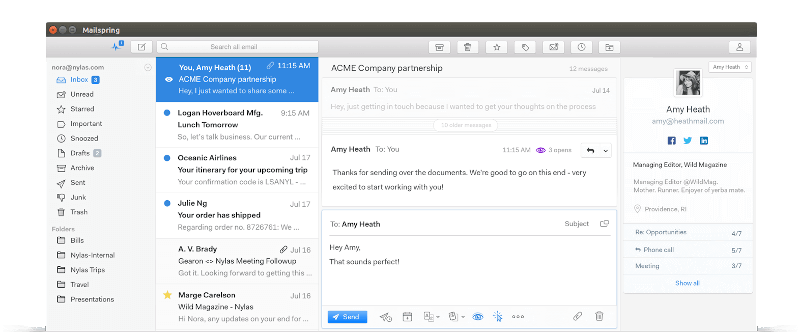
To install Mailspring in Linux, run:
$ sudo snap install mailspring
Conclusion
Whether you seek basic or advanced functionalities, the aforementioned email clients will serve you well; if you use others not mentioned here, please share them in the comment section below.
